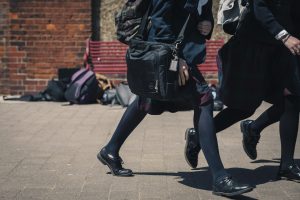Collective grants
We are here to help ease the difficulties that sometimes happen with the education of children of members of the Armed Forces as a result of their parents’ service. Education for children and young people is a vital part of their lives and our modern society. Children should not miss out and we aim to support the most disadvantaged children to improve education.
Collective grants are awarded to an education provider (normally a school or education authority) to help provide educational support for service pupils. Such support is likely to include a specific educational intervention as a result of which the improved educational outcomes of the service children can be demonstrated. We may also be able to help with a grant to assist an individual child to overcome difficulties linked to their parents’ service and mobility.
See below to see if your organisation could be eligible.
Success Stories
As the location of Europe’s largest garrison and with a significant RAF presence, North Yorkshire has a large population of Service children. Comparative pupil performance data regularly shows that their Service pupils, who experience high levels of mobility and deployment, perform less well than their civilian peers in a range of measures and it has been recognised that supporting the emotional needs of the pupils can help their overall performance.
Two years ago, the Trust awarded a grant to deliver Emotional First Aid training (EFA) for teachers, teaching assistants and pastoral support staff in schools. The training helps participants to recognise distress and develop strategies for early intervention or, if possible, prevention of issues developing. Three courses for staff in primary and secondary schools and for parents were delivered. Everyone who participated in the course, say they have since used what they learnt in the schools they work in and have seen immediate benefits.
“This course really got me thinking about my approaches to dealing with service children who are struggling with difficult feelings and situations, resulting from their parent’s service.”
– Participant, Emotional First Aid training
The Trust has supported a large number of service children in North Yorkshire County Council schools. Among a number of practitioners who undertook the Trust funded ‘Emotional First Aid’ (EFA) ‘train the trainer course’, with the aim of cascading the learning across the county, were two Service Pupil Champions.
Recognising their key role in supporting the children of military families, who often experience issues with parents being away from home and frequent changing of schools, the Trust awarded a grant to continue the employment of North Yorkshire County Council’s two Service Pupils’ Champions when Education Support Funding stopped. The Champions raised awareness of Service pupils’ needs through staff CPD as well as providing a link between military and school partners and providing early intervention & signposting to other services.
The Champion’s EFA training has led to delivering Anxiety Workshops for service children and parents, the benefits of which have been huge, and the long-term impact is already being seen.
“The session was effective in offering our most vulnerable children support in managing their emotions and fears. It was notable how deep-seated and serious many concerns raised were. We need to be acutely aware as a staff of the sorts of profound concerns our children may be carrying.”
– Head, RAF Leeming Primary School
“One of the biggest challenges for service children is having to move schools often. This makes it difficult for the school to know what prior learning the children have done and if there are any gaps” – Head Teacher, Kiwi School.
This high mobility is often particularly marked in mathematics where mobility is found to affect the acquisition of skills and knowledge.
The Trust has provided a grant to a group of Wiltshire schools with significant number of children from service families. The methodology of the Numbers Count programme involves the close and intensive support of small groups of children. Pupil progress at the 3 month re-assessment ranges from +3 months to +29 months as well as changes in their dispositions for learning and being more confident, tenacious and willing learners across all subject areas.
The intervention practitioners have also been instrumental in leading training for school staff and have had a significant impact on the educational outcomes of all the service children attending the school.
“Mobile service children face new issues at secondary school. School options are usually different so we need to support a child to change/choose subjects other than their current choices. In addition, children moving to Welsh schools may have never learnt the language, which is now compulsory at GCSE”. – Deputy Headteacher, Llantwit Major School
The Trust provided funding for Llantwit School in Wales for a Support Officer to monitor and support the large number of service pupils at the school and also manage the grant funded MPCT (Motivational Preparation College for Training) programme that enhanced team building and leadership across the cluster of schools thus integrating service pupils and building their confidence and skills.
The Support officer assists with a range of interventions addressing a whole range of issues affecting service children of the schools. The work has had significant impact with emotional stability and life skills, and examination preparation and outcomes. Pupils of all abilities have been supported to ensure that they reach their potential by being helped with gaps in their education, and/or with emotional support and mentoring.
Applying for a collective grant
The first step is to answer a few short questions about your school/organisation. If you meet the application criteria you will be asked to complete a second form with your contact details and a brief summary of the nature of your enquiry. We will then contact you to discuss the best way forward which may be to invite you to complete an online application. Once the completed application has been received, it will be considered by the Trust at the next Trustees' meeting. We will contact you if we need any more information and will keep you up to date with progress. Please download our Collective Application Guidelines here for more information.



